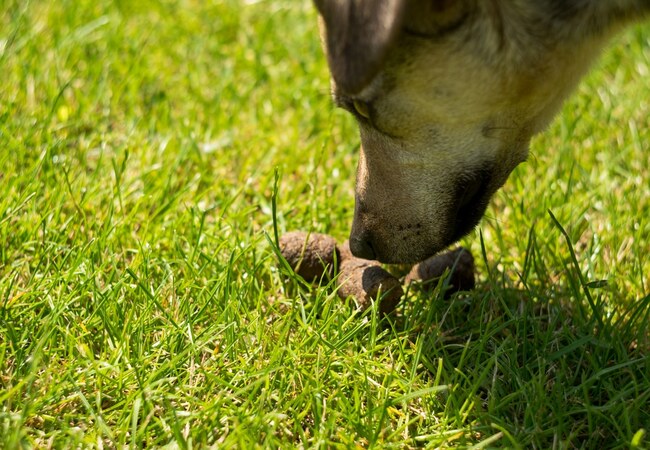2025 Vet Guide: Why Does My Dog Eat Poop? Causes, Care & Prevention 🐶💩

In this article
2025 Vet Guide: Why Does My Dog Eat Poop? Causes, Care & Prevention 🐶💩
By Dr. Duncan Houston BVSc
Hello, I’m Dr Duncan Houston BVSc, veterinarian and founder of Ask A Vet. Coprophagia—the act of eating feces—is a behavior that many dog parents dread, but it’s more common (and complex) than you think. In this 2025 guide, we’ll dive into biological instincts, behavioral triggers, health causes, and compassionate, practical solutions to curb this often messy issue. You’re not alone—and there’s plenty you can do. 🛡️🐾
1. Is It Normal or Concerning?
Many puppies will eat feces—it’s a natural, den-cleaning behavior taught by their mother. Adult dogs may continue due to a range of causes, and while it’s unpleasant, it’s often treatable with care.
2. Medical Causes: When to Investigate 🩺
- Malabsorption or nutritional deficiencies: Conditions like pancreatic insufficiency or poor-quality diet lead dogs to ingest stool for residual nutrients.
- Endocrine and metabolic disorders: Diabetes, hypothyroidism, Cushing’s, and polyphagia-inducing medications can trigger coprophagia.
- Parasites or GI upset: Worms or inflammation may prompt stool-eating.
- Cognitive dysfunction: Aging dogs with dementia may eat waste due to confusion.
3. Behavioral Causes: Why They Do It
- Instinct & mimicry: Puppies learn from mother dogs; adults may continue copying.
- Boredom or isolation: Dogs kept alone or under-stimulated often explore via taste.
- Attention-seeking: If they notice dramatic reactions, they repeat behavior for attention.
- Stress or anxiety: They may self-soothe or remove “evidence” of an accident.
- Taste appeal: Feces—especially from other animals (e.g., cats)—may contain appealing undigested food.
4. Risks & Concerns
While many dogs show no health effects, coprophagia can spread parasites, harmful bacteria, or drug residues. It may also mask an underlying disease that needs attention.
5. Veterinary Assessment: The First Step
- History & physical exam—diet, habits, medications.
- Fecal testing—parasites, malabsorption.
- Bloodwork—checking endocrine and metabolic health.
- Dietary review—quality, digestibility improvements.
6. Prevention & Management Strategies ✅
6.1 Immediate Environmental Control
- Pick up feces immediately—even in multi-dog households.
- Supervise outdoor time; use a leash in high-risk areas.
- Use a muzzle or management tool during training.
6.2 Training & Redirection
- Teach “leave it” and recall commands with consistent rewards.
- Redirect behaviors—offer toys, treats, or Woopf puzzle chews when they approach feces.
- Ignore attention-seeking poop-eating; reinforce neutral behaviors instead.
6.3 Diet & Supplementation
- Switch to a highly digestible, high-quality food.
- Use enzyme or taste-aversion products as directed (e.g., For-Bid, Pet MD deterrents).
- Address nutrient deficiencies under vet guidance.
6.4 Mental & Physical Enrichment
- Increase exercise and interaction—lonely dogs are more likely to eat poop.
- Use interactive Woopf toys and training games to engage interest.
- Calming tools (Purrz pheromones) for anxious dogs.
6.5 Regular Monitoring & Reassessment
- Maintain logs of incidents, frequency, and context.
- Re-pick test stool samples as needed.
- Keep up dietary and behavioral plans; adjust as the dog matures or ages.
7. Special Considerations by Life Stage & Context
Puppies
Normal den behavior, but best discouraged early to avoid lifelong habits. Supervision and redirecting work well.
Adults
Often behavioral, but could signal disease—always evaluate medically.
Seniors
Onset in older dogs warrants evaluation for cognitive or GI disorders.
8. FAQs on Coprophagia ❓
- Q: Is this just a phase?
- A: Puppies often outgrow it, but if it persists, behavioral and medical steps are essential.
- Q: Will punishment help?
- A: No—punishment confuses them and may reinforce the behavior.
- Q: Are deterrent supplements effective?
- A: They can help when used consistently, alongside environmental control and training.
- Q: When should I worry?
- A: Sudden onset, frequent occurrence, or health changes—all warrant vet attention.
9. Ask A Vet Support & Products 🛠️
Tap into the Ask A Vet app for:
- 24/7 chats to assess your dog’s eating behavior and possible health issues.
- Tailored nutrition and supplement recommendations (enzyme treats, taste aversion chews).
- Training walkthroughs—commands, redirection, and enrichment plans.
- Access to calming aids (Purrz) and mental engagement tools (Woopf).
- Behavior logs, progress tracking, and expert referrals if needed.
🩺 Final Vet Wisdom
Coprophagia isn’t shameful—it’s communication. Whether driven by instinct, boredom, anxiety, or health issues, this behavior can be solved with patience, veterinary care, and positive training. You’ve got this—and Ask A Vet is here to help improve your dog’s wellbeing and your peace of mind. 💪🐾






